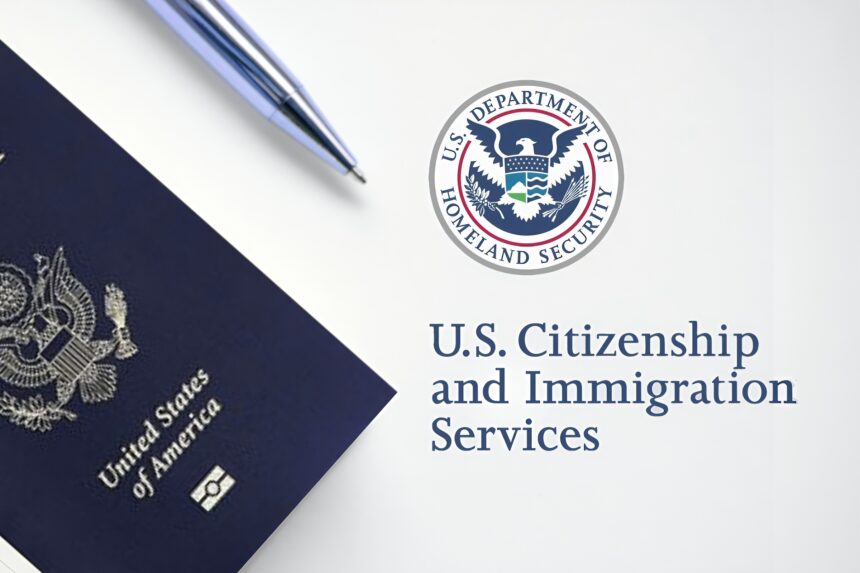The U.S. Department of Homeland Security (DHS) and U.S. Citizenship and Immigration Services (USCIS) have officially commenced the collection of a new $1k immigration parole fee.
It was gathered that the new policy was mandated by the sweeping H.R. 1 Reconciliation Bill.
Effective today, Thursday, October 16, 2025, the $1k immigration parole fee applies to most individuals who are paroled or re-paroled into the United States.
This was contained in a press statement posted on the official website of the USCIS.
According to the statement, the $1k immigration parole fee is a mandatory charge, which is subject to annual adjustments for inflation.
The USCIS announced that the fee applies to any non-citizen granted parole—temporary permission to enter or remain in the U.S. for urgent humanitarian reasons or significant public benefit—as well as those applying for re-parole (an extension of that status).
The fee is not collected at the time of filing Form I-131, the standard application for travel documents. Instead, applicants will receive a specific notice and instructions to pay the $1,000 immigration parole fee after USCIS determines that their request for parole or re-parole can be approved.
The agency also warned that failure to remit payment by the specified deadline will result in the denial of the parole request.
The requirement for the $1,000 immigration parole fee stems directly from the H.R. 1 Reconciliation Bill, which sought to address funding for various immigration and border enforcement measures.
The statement reads: “The Department of Homeland Security is publishing a Federal Register notice to implement a new immigration parole fee required by the H.R. 1 Reconciliation Bill. The fee is $1,000 for FY 2025 and is subject to annual adjustments for inflation. You must pay this fee when you are paroled into the United States, unless you qualify for an exception.
“Our critical work does not stop during the Democrats’ government shutdown. We remain steadfast in protecting our homeland by upholding lawful immigration.
“The Federal Register notice explains when the immigration parole fee takes effect, exceptions to the fee, and consequences if you do not pay.
“USCIS will collect the immigration parole fee if you are physically present in the United States and we are granting you parole or a new period of parole (also known as re-parole). Beginning on Oct. 16, 2025, if we determine that we can approve your request for parole or re-parole and that it requires payment of the immigration parole fee, we will notify you that you must pay this fee before we can approve your request. The notice will have payment instructions and a deadline. We will not grant parole unless you pay the immigration parole fee as instructed and within the specified time period.
“Do not pay the immigration parole fee when you submit Form I-131, Application for Travel Documents, Parole Documents, and Arrival/Departure Records. The immigration parole fee will be collected when you are paroled into the United States. For more information about when Customs and Border Protection or Immigration and Customs Enforcement will collect the immigration parole fee, see the Federal Register notice.”
Pan-Atlantic Kompass reports that people entering or re-entering the U.S. under parole must make the immigration parole fee payment.
Parole allows noncitizens to enter or remain in the country temporarily for urgent humanitarian reasons or significant public benefit, even if they don’t have a visa.
In simple terms, if USCIS grants you permission to enter or extend your stay in the U.S. under parole or extend an existing parole period, you must pay the new $1,000 fee before approval.
However, some people may qualify for exceptions, which will be outlined in the Federal Register notice published by the DHS. The agency has not yet released full details of who might be exempt, but the notice will clarify the categories and conditions for exemption.
The development comes amid the ongoing immigration overhaul by the administration of United States President Donald Trump.
Recently, Trump announced that U.S. H-1B visa applications will now attract a $100,000 fee. It was gathered that the $100,000 would be a single upfront fee tied only to the first petition
Recall also that Trump has unveiled a $1 million Gold Card, a premium visa program targeting the world’s wealthiest immigrants for expedited residency and a pathway to citizenship.
Announced via executive order, Trump declared that the initiative is expected to generate billions in revenue while prioritizing high-value contributors to the American economy.





